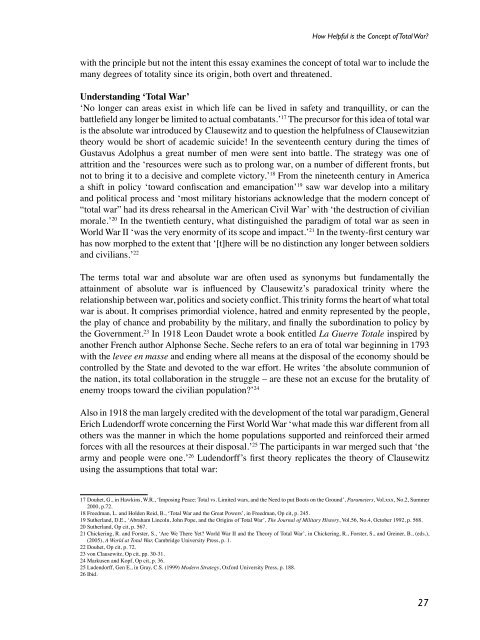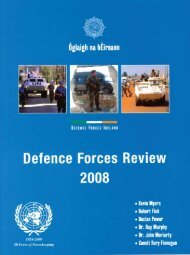Defence Forces Review 2010
Defence Forces Review 2010
Defence Forces Review 2010
You also want an ePaper? Increase the reach of your titles
YUMPU automatically turns print PDFs into web optimized ePapers that Google loves.
How Helpful is the Concept of Total War?with the principle but not the intent this essay examines the concept of total war to include themany degrees of totality since its origin, both overt and threatened.Understanding ‘Total War’‘No longer can areas exist in which life can be lived in safety and tranquillity, or can thebattlefield any longer be limited to actual combatants.’ 17 The precursor for this idea of total waris the absolute war introduced by Clausewitz and to question the helpfulness of Clausewitziantheory would be short of academic suicide! In the seventeenth century during the times ofGustavus Adolphus a great number of men were sent into battle. The strategy was one ofattrition and the ‘resources were such as to prolong war, on a number of different fronts, butnot to bring it to a decisive and complete victory.’ 18 From the nineteenth century in Americaa shift in policy ‘toward confiscation and emancipation’ 19 saw war develop into a militaryand political process and ‘most military historians acknowledge that the modern concept of“total war” had its dress rehearsal in the American Civil War’ with ‘the destruction of civilianmorale.’ 20 In the twentieth century, what distinguished the paradigm of total war as seen inWorld War II ‘was the very enormity of its scope and impact.’ 21 In the twenty-first century warhas now morphed to the extent that ‘[t]here will be no distinction any longer between soldiersand civilians.’ 22The terms total war and absolute war are often used as synonyms but fundamentally theattainment of absolute war is influenced by Clausewitz’s paradoxical trinity where therelationship between war, politics and society conflict. This trinity forms the heart of what totalwar is about. It comprises primordial violence, hatred and enmity represented by the people,the play of chance and probability by the military, and finally the subordination to policy bythe Government. 23 In 1918 Leon Daudet wrote a book entitled La Guerre Totale inspired byanother French author Alphonse Seche. Seche refers to an era of total war beginning in 1793with the levee en masse and ending where all means at the disposal of the economy should becontrolled by the State and devoted to the war effort. He writes ‘the absolute communion ofthe nation, its total collaboration in the struggle – are these not an excuse for the brutality ofenemy troops toward the civilian population?’ 24Also in 1918 the man largely credited with the development of the total war paradigm, GeneralErich Ludendorff wrote concerning the First World War ‘what made this war different from allothers was the manner in which the home populations supported and reinforced their armedforces with all the resources at their disposal.’ 25 The participants in war merged such that ‘thearmy and people were one.’ 26 Ludendorff’s first theory replicates the theory of Clausewitzusing the assumptions that total war:17 Douhet, G., in Hawkins, W.R., ‘Imposing Peace: Total vs. Limited wars, and the Need to put Boots on the Ground’, Parameters, Vol.xxx, No.2, Summer2000, p.72.18 Freedman, L. and Holden Reid, B., ‘Total War and the Great Powers’, in Freedman, Op cit, p. 245.19 Sutherland, D.E., ‘Abraham Lincoln, John Pope, and the Origins of Total War’, The Journal of Military History, Vol.56, No.4, October 1992, p. 568.20 Sutherland, Op cit, p. 567.21 Chickering, R. and Forster, S., ‘Are We There Yet? World War II and the Theory of Total War’, in Chickering, R., Forster, S., and Greiner, B., (eds.),(2005), A World at Total War, Cambridge University Press, p. 1.22 Douhet, Op cit, p. 72.23 von Clausewitz, Op cit, pp. 30-31.24 Markusen and Kopf, Op cit, p. 36.25 Ludendorff, Gen E., in Gray, C.S. (1999) Modern Strategy, Oxford University Press, p. 188.26 Ibid.27
















